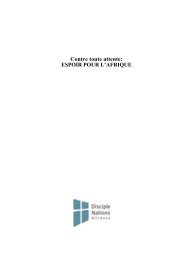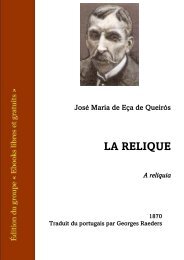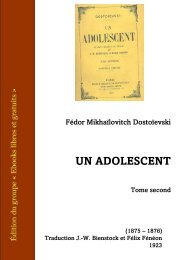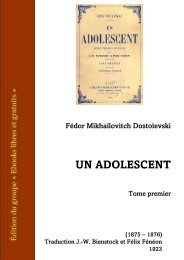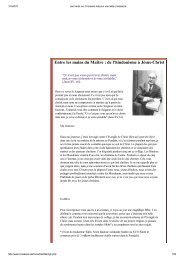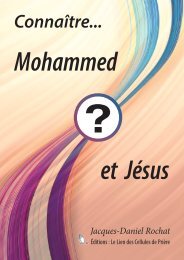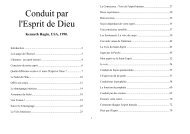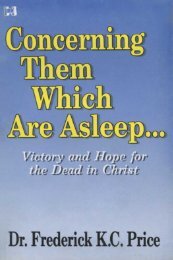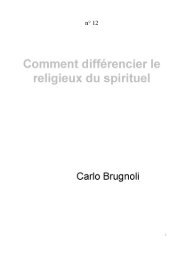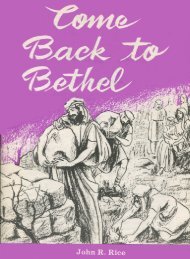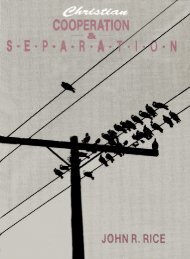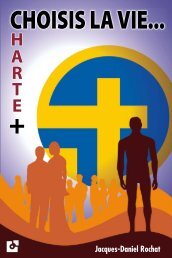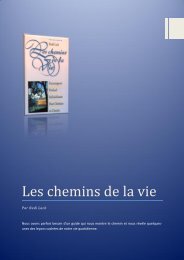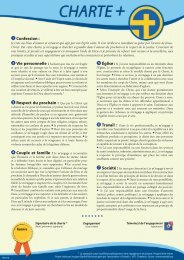341332
You also want an ePaper? Increase the reach of your titles
YUMPU automatically turns print PDFs into web optimized ePapers that Google loves.
30 FATHERS, PASTORS AND KINGS<br />
council, consisting of bishops who were directed by the Holy Spirit: 51 a general<br />
council held supremacy over the pope. Gerson also allowed bishops a large<br />
degree of independent authority in their dioceses as well as within the framework<br />
of decision-making within the church. Papal authority over bishops was<br />
executive, meaning that the pope was obliged to ensure that prelates exercised<br />
their jurisdiction according to canonical norms. Otherwise, however, he could<br />
not act in dioceses without their consent, for his power over them was not<br />
absolute. Episcopal jurisdiction was, therefore, not directly derived from him.<br />
Unlike the Council of Trent, the French theologian had no difficulty in confirming<br />
that bishops held their jurisdiction according to droit divin. 52<br />
Cardinal de Lorraine affirmed his faithfulness to this heritage when he<br />
commented in 1563 that ‘I am French, nourished in the University of Paris,<br />
which holds the authority of a council above the pope, and which censured as<br />
heretics those who hold the contrary view.’ 53 Although he and his fellows were<br />
fundamentally in favour of the Council of Trent, 54 they simply could not stomach<br />
the suggestion that the pope’s universal authority allowed him to override<br />
episcopal jurisdiction, especially since this did not even derive from him. The<br />
conciliar theory incorporated and legitimated both of these assumptions: from<br />
the belief that the pope did not possess universal jurisdiction within the church,<br />
it was logical to assume that he could not interfere in the government of bishops<br />
within individual churches and that, therefore, they held their power of<br />
jurisdiction directly from God.<br />
It was largely due to the papacy’s fear of French support for conciliarist<br />
ideas that it so actively encouraged the inclusion of a canon confirming the universality<br />
of papal jurisdiction in 1562 and 1563. Pius IV and his legates even suspected<br />
that the French would abandon Trent and in its place hold a national<br />
council to resolve the problems of the gallican church and protestantism. After<br />
all, the French had, under Louis XII, convoked the infamous Council of Pisa in<br />
1511which re-issued the decrees of Constance. 55 Then, in 1551, Henri II had<br />
come perilously close to rupturing all relations with the papacy, when Julian III<br />
opposed his proposal for a national council to tackle reform. 56 Judging from past<br />
events, comparable initiatives seemed perfectly possible to the sensitive papal<br />
circle in the early 1560s. Only recently, the Colloquy of Poissy (1561) had also,<br />
in its view, displayed the alarming characteristics of a national council independent<br />
of papal control. 57 At the time of the Colloquy, Pius IV had been horrified<br />
by the prospect of it mutating from a meeting to reform the French church into<br />
a national council proposing to resolve matters of faith and morals, and appears<br />
to have assumed that a gallican council would inevitably mean a wholly independent<br />
gallican church. In particular, Pius mistrusted Lorraine’s motives and<br />
did his utmost to ensure that the papacy could offset any movement along the<br />
road to a gallican council by deftly obliging the cardinal, as a newly appointed




